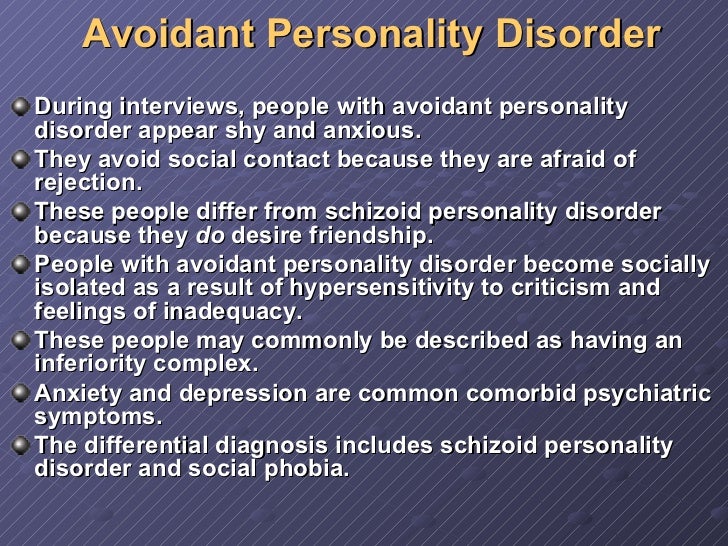Avoidant Personality Disorder, often abbreviated as APD, is a complex mental health condition that affects how individuals perceive themselves and interact with the world around them. Characterized by pervasive feelings of inadequacy, extreme sensitivity to criticism, and a strong desire to avoid social interactions, this disorder can significantly impact an individual’s quality of life. Despite its challenges, understanding the causes, recognizing the symptoms, and exploring treatment options can help those affected manage their condition effectively.

What Is Avoidant Personality Disorder?
Avoidant Personality Disorder is a type of personality disorder that falls under Cluster C in the Diagnostic and Statistical Manual of Mental Disorders. People with this condition often feel inadequate, are highly sensitive to rejection, and go to great lengths to avoid situations where they might be judged or criticized. Unlike shyness, which is a common trait, this disorder involves deeply ingrained patterns of behavior that persist over time and interfere with daily functioning.
Key Characteristics
- Intense fear of rejection or criticism
- Reluctance to engage in social activities or form relationships
- Feelings of inferiority compared to others
- Excessive preoccupation with being disliked or ridiculed
- Avoidance of risks or new experiences due to fear of failure
Causes of Avoidant Personality Disorder
The exact cause of Avoidant Personality Disorder is not fully understood, but researchers believe it arises from a combination of genetic, environmental, and psychological factors. Below are some of the primary contributors to the development of this condition.
Genetic Factors
Research suggests that genetics may play a role in the development of Avoidant Personality Disorder. Individuals with a family history of anxiety disorders or other personality disorders may be more susceptible to developing this condition. While no specific gene has been identified, inherited traits such as heightened sensitivity to stress or emotional reactivity may contribute to its onset.
Environmental Influences
Early life experiences can significantly shape personality development. Children who grow up in environments where they are frequently criticized, rejected, or emotionally neglected may be at higher risk of developing Avoidant Personality Disorder. For example, overly critical parents or peers who bully or ostracize a child can lead to feelings of inadequacy and fear of social interaction later in life.
Psychological Factors
Certain personality traits, such as low self-esteem or a tendency toward anxiety, can predispose individuals to this disorder. Additionally, maladaptive thought patterns—such as assuming others will judge them harshly—can reinforce avoidance behaviors. Over time, these patterns become ingrained, making it difficult for individuals to break free from the cycle of avoidance.
Symptoms of Avoidant Personality Disorder
The symptoms of Avoidant Personality Disorder manifest in various ways, affecting both personal and professional aspects of an individual’s life. These symptoms often overlap with those of social anxiety disorder, but they tend to be more pervasive and enduring.
Social Withdrawal
One of the hallmark symptoms is the consistent avoidance of social interactions. Individuals may decline invitations to social events, avoid meeting new people, or isolate themselves from friends and family. This withdrawal is driven by an intense fear of being judged or rejected.
Fear of Criticism
People with this disorder are hypersensitive to criticism, whether real or perceived. Even constructive feedback can be interpreted as a personal attack, leading to feelings of shame or humiliation. This fear often prevents them from taking risks or pursuing opportunities that could improve their lives.
Low Self-Esteem
A persistent sense of inadequacy is another common symptom. Individuals may view themselves as socially inept, unappealing, or inferior to others. This negative self-image reinforces their belief that they are unworthy of love or acceptance.
Reluctance to Form Relationships
Despite a deep longing for close relationships, individuals with this disorder often struggle to form meaningful connections. They may avoid romantic relationships or friendships out of fear that they will be rejected or abandoned once others get to know them.
Physical Manifestations
- Trembling or sweating in social situations
- Rapid heartbeat when faced with potential judgment
- Difficulty speaking or maintaining eye contact
Diagnosing Avoidant Personality Disorder
Diagnosing this condition requires a comprehensive evaluation by a mental health professional. Since the symptoms of Avoidant Personality Disorder overlap with other mental health issues, such as social anxiety disorder or depression, an accurate diagnosis is crucial for effective treatment.
Evaluation Process
The diagnostic process typically involves a detailed interview to assess the individual’s thoughts, feelings, and behaviors. The clinician may also use standardized questionnaires or assessment tools to gather additional information. A thorough review of the person’s medical and psychiatric history helps rule out other possible causes of their symptoms.
Differential Diagnosis
It is important to differentiate Avoidant Personality Disorder from similar conditions. For instance, while social anxiety disorder shares many features, it tends to focus more on performance-related fears rather than pervasive feelings of inadequacy. Similarly, depression may involve social withdrawal, but it does not necessarily include the same level of fear of rejection.
Treatment Options for Avoidant Personality Disorder
While there is no cure for Avoidant Personality Disorder, several treatment approaches can help individuals manage their symptoms and improve their quality of life. The most effective treatments combine psychotherapy, medication, and lifestyle changes.
Psychotherapy
Therapy is considered the cornerstone of treatment for this condition. Various therapeutic modalities have proven beneficial, including:
Cognitive Behavioral Therapy
Cognitive behavioral therapy focuses on identifying and challenging negative thought patterns that contribute to avoidance behaviors. Through structured exercises, individuals learn to replace self-defeating beliefs with healthier, more realistic ones. Over time, they gain confidence in their ability to handle social situations without excessive fear of judgment.
Psychodynamic Therapy
This approach explores unconscious processes and unresolved conflicts from early childhood that may influence current behavior. By gaining insight into these underlying issues, individuals can begin to address the root causes of their avoidance tendencies.
Group Therapy
Participating in group therapy provides a safe environment for practicing social skills and receiving support from others facing similar challenges. Group settings allow individuals to test their assumptions about rejection and build trust in interpersonal relationships.
Medication
While medication cannot treat the core features of Avoidant Personality Disorder, it can help alleviate co-occurring symptoms such as anxiety or depression. Commonly prescribed medications include:
- Selective serotonin reuptake inhibitors to reduce anxiety and improve mood
- Beta-blockers to manage physical symptoms like rapid heartbeat during stressful situations
- Anti-anxiety medications for short-term relief of severe symptoms
Lifestyle Changes
In addition to professional treatment, certain lifestyle modifications can support recovery. These include:
- Practicing mindfulness techniques to stay present and reduce rumination
- Engaging in regular physical activity to boost mood and reduce stress
- Building a supportive network of friends or joining community groups to combat isolation
Challenges in Treating Avoidant Personality Disorder
Treating this condition presents unique challenges due to the nature of the disorder itself. Many individuals hesitate to seek help because they fear being judged or misunderstood by therapists. Additionally, progress in therapy can be slow, requiring patience and persistence from both the client and the clinician.
Barriers to Seeking Help
Common barriers include stigma surrounding mental health, lack of awareness about available resources, and financial constraints. Addressing these obstacles requires increased education and advocacy efforts within communities.
Importance of Early Intervention
Early intervention can make a significant difference in outcomes for individuals with this disorder. By addressing symptoms before they become deeply entrenched, therapists can help clients develop healthier coping mechanisms and prevent further isolation.





